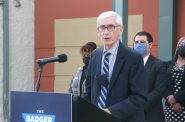Advisory Referendums Have Meant Little
Legislators are considering advisory referendums on legalizing marijuana and making Daylight Savings Time permanent.
![Marijuana plant. Photo by Jennifer Martin (Own work) [CC BY-SA 4.0 (http://creativecommons.org/licenses/by-sa/4.0)], via Wikimedia Commons.](https://urbanmilwaukee.com/wp-content/uploads/2016/09/Marijuana_Plant_03.jpg)
Marijuana plant. Photo by Jennifer Martin (Own work) [CC BY-SA 4.0 (http://creativecommons.org/licenses/by-sa/4.0)], via Wikimedia Commons.
But, although non-binding referendums can trigger emotions and voter turnout, they have not usually played major roles in public-policy decisions in Wisconsin. Although voters in some states can bypass elected officials and write new laws by petitioning to get those changes on a referendum ballot, and then passing it, Wisconsin does not allow that.
A review of past advisory referendums is a reminder of how some issues never go away.
“Just put it out to voters,” Schraa told Wisconsin Public Radio last week. “Let the people decide.”
But it would be the third advisory referendum on Daylight Savings Time. In 1947, voters (55% to 45%) rejected the “spring forward” clock rule only to approve it 10 years later (same margin: 55% to 45%).
One more example of the history lessons in past referendums.
In April 1964 – a vote that foreshadowed the biggest controversy in the Capitol today – 85% of voters refused to go along with raising the 6-cent per gallon gas tax to build highways. This year, some legislators and special-interest groups want to raise the gas tax, now 30.9-cents per gallon, to maintain highway projects and avoid more borrowing. Nobody wants an advisory referendum on a gas tax increase , however.
But Sen. Jon Erpenbach and Rep. Chris Taylor want an advisory referendum on legalizing medical marijuana. They say 28 states have legalized it and University of Michigan researchers found patients who used medical marijuana to treat chronic pain reported a 64% reduction in their use of opioid painkillers.
“When facing a growing opioid epidemic in Wisconsin, why on earth would we ignore a viable, commonsense solution that has been shown to dramatically reduce opioid abuse?” Taylor said.
Added Erpenbach: “A statewide referendum would provide Gov. Walker and legislators across Wisconsin with the support and peace of mind needed to advance this legislation.”
There probably won’t be an advisory referendum on medical marijuana, however.
Although Assembly Speaker Robin Vos told reporters he was willing to consider medical marijuana, conservative Republican senators won’t take any steps that could lead to it.
Republican Gov. Scott Walker agrees. “I’m not interested in opening the door towards legalizing marijuana, be it overall or even for medical marijuana, because I think studies show medically there are much more viable alternatives,” Walker told reporters in Green Bay.
Over the last 70 years, Wisconsin has held 17 advisory referendums. But five of those 17 were held on the same day – April 1993, when legislators asked for advice on what type of legalized gambling to allow.
Past referendums included whether to levy a 3% sales tax for veterans’ homes (failed in 1947), for a nuclear weapons moratorium (1982) and against any nuclear waste storage site here (1983).
That 2006 vote was only scheduled because restoring the death penalty was a priority of then-Senate President Alan Lasee, an avid motorcyclist who also raised llamas, camels, miniature donkeys and fainting goats.
Legislators said, since voters were already electing a U.S. Senator and governor in November 2006, it wouldn’t cost a lot more to go along with Lasee’s request.
Before the 2006 vote, the last advisory referendum was held in April 1993, when voters officially changed the State Constitution to legalize gambling. On that same ballot, elected officials asked voters for guidance – through five confusing advisory referendum questions – on what type of gaming to legalize.
In 1853, five years after Wisconsin became state, legislators scheduled one of the first advisory referendums on whether to prohibit liquor statewide. What did voters advise? Yes, by a vote of 27,519 to 24,109.
Another example of how advisory referendums have meant almost nothing. Make yourself a drink.
Steven Walters is a senior producer for the nonprofit public affairs channel WisconsinEye. Contact him at stevenscwalters@gmail.com
The State of Politics
-
Supreme Court Justices Call for More Security
 Jun 23rd, 2025 by Steven Walters
Jun 23rd, 2025 by Steven Walters
-
Evers, Republicans Close on Budget’s Tax Cut Plan
 Jun 16th, 2025 by Steven Walters
Jun 16th, 2025 by Steven Walters
-
New Legislators Sponsor ‘Wish List’ Bills
 Jun 9th, 2025 by Steven Walters
Jun 9th, 2025 by Steven Walters






















I vote “yes”.
On CDT.
The other thing too, what the heck.
Oh well, at least they make the ballot a bit more interesting.